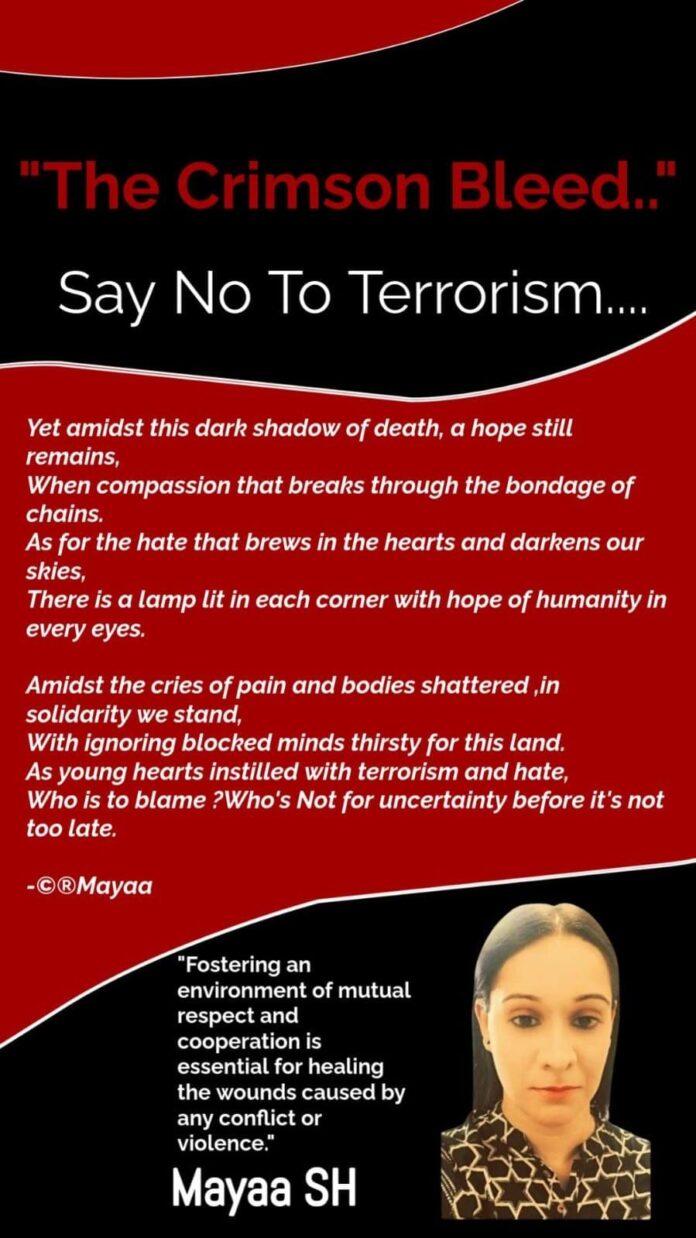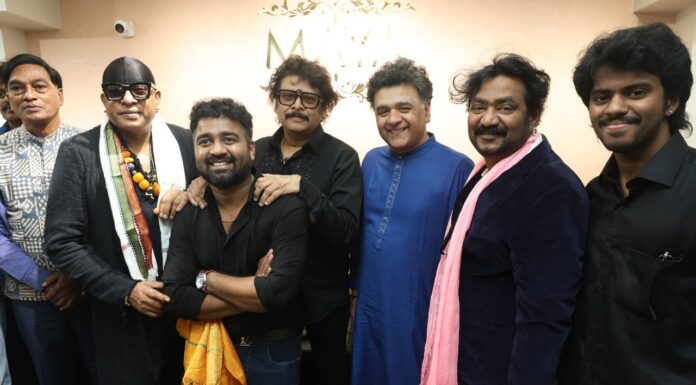Mayaa SH has condemned terrorism as a violent act that leads to division and suffering, emphasizing the need for dialogue and understanding among different community groups. In her public statements regarding recent violence in Pahalgam, she has articulated that killing in the name of religion is a significant moral failing and calls for immediate dialogue among all stakeholders to address the underlying issues that lead to such violence. She believes that violence only exacerbates existing tensions and does not resolve grievances. Instead, Mayaa SH advocates for non-violent approaches to conflict resolution, stressing the importance of maintaining communal harmony. Her efforts include sensitising citizens on efforts aimed at healing the wounds caused by conflicts, which serve as platforms for individuals from diverse backgrounds to share their experiences and perspectives. This initiative aims to build trust within the community and foster collaborative approaches to addressing the root causes of unrest
In recent events, the violence in Pahalgam has drawn significant attention and concern from various stakeholders, including local leaders and organizations. Mayaa SH, a prominent national figure, has responded to this situation with a focus on promoting peace and community resilience. Her ideology that terrorism is not related to any religion has unequivocally emphasised on “Say No To Terrorism”..
Mayaa SH has condemned the violence, emphasizing the need for dialogue and understanding among different community groups. In her statements, she highlighted that violence only leads to further division and suffering, urging all parties involved to seek non-violent resolutions to their grievances. She has called for a collective effort from local leaders, civil society organizations, and residents to foster an environment of mutual respect and cooperation.
Additionally, Mayaa SH has been actively involved in being participative in peace initiatives and community meetings aimed at healing the wounds caused by recent conflicts. These serve not only as a platform for expressing solidarity but also as an opportunity for individuals from diverse backgrounds to share their experiences and perspectives. By facilitating these discussions, she aims to build trust within the community and encourage collaborative approaches to addressing underlying issues that may have contributed to the unrest.
Killing In The Name Of Religion is the highest form of Sin. In light of this tragedy, heartfelt condolences to the families of those who lost their lives in such a barbaric and horrific act of cowardice and sin. This calls for immediate dialogue among all stakeholders to address the underlying issues that lead to such violence.
In recent events, the violence in Pahalgam has reinstated that the focus has to be reinstated furthermore on promoting peace and community resilience. Moreover, Mayaa SH has reached out to authorities, advocating for increased support for conflict resolution initiatives in Pahalgam. She believes that effective governance plays a crucial role in maintaining peace and stability in the region. Her advocacy includes calls for better resource allocation towards education and economic development programs that can help alleviate some of the tensions rooted in socio-economic disparities.
The Crimson Bleed …
A penny heart bled crimson where dreams once soared,
The silence of the night sighed of a melancholy anecdote stored.
Innocent smiles crumbled, like a shooting star in the night,
One gun shot pulled from the trigger extinguished the light.
The once vibrant valley, now echo songs of fear,
The bloodshed through alleys, where innocent hearts were dear.
Mourn in silence the suffering, the houses massacred apart,
By mindset pierced like a bullet to the heart.
The serpentine red shadow paints a dark hue,
Every drop of blood inks a memoir of lives that flipped and flew.
Voices and verses so broken, the flicker of the lamp dimmed,
Chaos sparks a thought in the minds as death sheepishly swims.
What it takes to stoop so low in despair?
To masquerade one’s ideologies in sadistic glare?
Is it the avenge for something unknown so refuged for ages that never flyby?
Or a refusal to give up on revenge that will never satisfy?
Yet amidst this dark shadow of death, a hope still remains,
When compassion that breaks through the bondage of chains.
As for the hate that brews in the hearts and darkens our skies,
There is a lamp lit in each corner with hope of humanity in every eyes.
Amidst the cries of pain and bodies shattered ,in solidarity we stand,
With ignoring blocked minds thirsty for this land.
As young hearts instilled with terrorism and hate,
Who is to blame? Who’s Not for uncertainty before it’s not too late.
So let us honour all those lost in the shadow of the day,
And light one lamp in the memory of those by choosing to stay.
In the silence of the lamp that banishes hatred,
Where kindness illuminates the world and good deeds remain our might.
Given the backdrop of a recent terrorist attack that resulted in the deaths of at least twenty tourists, violence prevention initiatives are crucial for restoring safety and stability. “Fostering an environment of mutual respect and cooperation is essential for healing the wounds caused by any conflict or violence ..”
Enhanced Security Measures:
One of the primary expected outcomes is the implementation of enhanced security protocols around tourist areas. This could include increased police presence, installation of surveillance cameras, and better coordination between local law enforcement and national security agencies. Such measures aim to deter potential attacks and reassure both locals and visitors about their safety.
Community Engagement and Awareness Programs:
All initiatives are likely to focus on community engagement, fostering dialogue among different groups within Pahalgam. By involving local residents in discussions about peace and security, these programs can help build trust between communities and law enforcement. Educational campaigns may also be introduced to raise awareness about the impacts of violence and promote peaceful coexistence.
Economic Stability through Tourism Recovery:
By improving safety perceptions, these initiatives are expected to aid in the recovery of tourism—a vital economic driver . As tourists return, local businesses will benefit from increased patronage, which can lead to job creation and overall economic stability in the region. This economic upliftment can further contribute to reducing tensions that often lead to violence.
Long-term Conflict Resolution Strategies:
In addition to immediate security measures, all initiatives may incorporate long-term strategies aimed at addressing underlying grievances that fuel conflict in Kashmir. This could involve advocating for political dialogue between various stakeholders, including government representatives and separatist groups, thereby working towards a more sustainable resolution to ongoing tensions.
Monitoring and Evaluation Frameworks:
To assess the effectiveness of these initiatives, establishing monitoring frameworks will be essential. Regular evaluations can help identify successful strategies as well as areas needing adjustment or improvement. This adaptive approach ensures that interventions remain relevant to changing circumstances on the ground.
In summary, Mayaa SH’s response to the violence in Pahalgam has been characterized by condemnation of violent acts, promotion of peaceful dialogue, organization of community engagement activities, and advocacy for supportive governmental policies aimed at fostering long-term peace.
“Advocacy for non-violent approaches to conflict resolution is a must and it is to be stressed that the importance of maintaining communal harmony is a must. The recent violence in Pahalgam, advocating for dialogue, peace-building efforts, and enhanced security measures while emphasizing the need for communal harmony…”



















